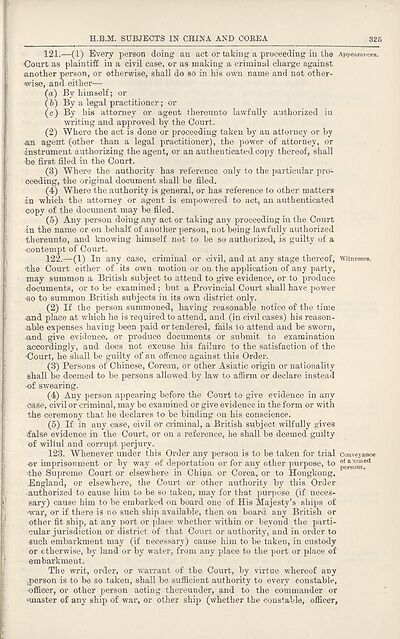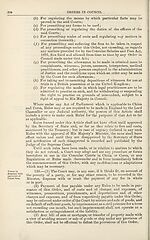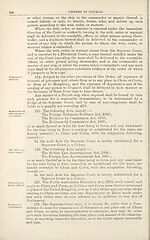1924
(381) Page 325
Download files
Complete book:
Individual page:
Thumbnail gallery: Grid view | List view

H.B.M. SUBJECTS IN CHINA AND COREA
325
121. —(1) Every person doing an act or taking a proceeding in the Appearances.
Court as plaintiff in a civil case, or as making a criminal charge against
another person, or otherwise, shall do so in his own name and not other¬
wise, and either—
(a) By himself; or
(b) By a legal practitioner; or
(c) By his attorney or agent thereunto lawfully authorized in
writing and approved by the Court.
(2) Where the act is done or proceeding taken by an attorney or by
an agent (other than a legal practitioner), the power of attorney, or
instrument authorizing the agent, or an authenticated copy thereof, shall
toe first filed in the Court.
(3) Where the authority has reference only to the particular pro¬
ceeding, the original document shall toe filed.
(4) Where the authority is general, or has reference to other matters
in which the attorney or agent is empowered to act, an authenticated
copy of the document may be filed.
(5) Any person doing any act or taking any proceeding in the Court
in the name or on behalf of another person, not being lawfully authorized
thereunto, and knowing himself not to be so authorized, is guilty of a
■contempt of Court.
122. —(1) In any case, criminal or civil, and at any stage thereof, witnesses,
the Court either of its own motion or on the application of any party,
may summon a British subject to attend to give evidence, or to produce
documents, or to be examined ; but a Provincial Court shall have power
-so to summon British subjects in its own district only.
(2) If the person summoned, having reasonable notice of the time
and place at which he is required to attend, and (in civil cases) his reason¬
able expenses having been paid or tendered, fails to attend and be sworn,
•and give evidence, or produce documents or submit to examination
accordingly, and does not excuse his failure to the satisfaction of the
•Court, he shall be guilty of an oft'ence against this Order.
(3) Persons of Chinese, Corean, or other Asiatic origin or nationality
shall be deemed to be persons allowed by law to affirm or declare instead
-of swearing.
(4) Any person appearing before the Court to give evidence in any
case, civil or criminal, may be examined or give evidence in the form or with
the ceremony that he declares to be binding on his conscience.
(5) If in any case, civil or criminal, a British subject wilfully gives
.false evidence in the Court, or on a reference, he shall be deemed guilty
of wiltul and corrupt perjury.
123. Whenever under this Order any person is to be taken for trial conveyance
or imprisonment or by way of deportation or for any other purpose, to ”,e*j^ed
•the Supreme Court or elsewhere in Chi pa or Corea, or to Hongkong,
England, or elsewhere, the Court or other authority by this Order
•authorized to cause him to be so taken, may for that purpose (if neces¬
sary) cause him to be embarked on board one of His Majesty’s ships of
war, or if there is no such ship available, then on board any British or
other fit ship, at any port or place whether within or beyond tire parti¬
cular jurisdiction or district of that Court or authority, and in order to
such embarkment may (if necessary) cause him to be taken, in custody
or otherwise, by land or by water, from any place to the port or place of
embarkment.
The writ, order, or warrant of the Court, by virtue whereof any
^person is to be so taken, shall be sufficient authority to every constable,
officer, or other person acting thereunder, and to the commander or
•master of any ship of war, or other ship (whether the constable, officer.
325
121. —(1) Every person doing an act or taking a proceeding in the Appearances.
Court as plaintiff in a civil case, or as making a criminal charge against
another person, or otherwise, shall do so in his own name and not other¬
wise, and either—
(a) By himself; or
(b) By a legal practitioner; or
(c) By his attorney or agent thereunto lawfully authorized in
writing and approved by the Court.
(2) Where the act is done or proceeding taken by an attorney or by
an agent (other than a legal practitioner), the power of attorney, or
instrument authorizing the agent, or an authenticated copy thereof, shall
toe first filed in the Court.
(3) Where the authority has reference only to the particular pro¬
ceeding, the original document shall toe filed.
(4) Where the authority is general, or has reference to other matters
in which the attorney or agent is empowered to act, an authenticated
copy of the document may be filed.
(5) Any person doing any act or taking any proceeding in the Court
in the name or on behalf of another person, not being lawfully authorized
thereunto, and knowing himself not to be so authorized, is guilty of a
■contempt of Court.
122. —(1) In any case, criminal or civil, and at any stage thereof, witnesses,
the Court either of its own motion or on the application of any party,
may summon a British subject to attend to give evidence, or to produce
documents, or to be examined ; but a Provincial Court shall have power
-so to summon British subjects in its own district only.
(2) If the person summoned, having reasonable notice of the time
and place at which he is required to attend, and (in civil cases) his reason¬
able expenses having been paid or tendered, fails to attend and be sworn,
•and give evidence, or produce documents or submit to examination
accordingly, and does not excuse his failure to the satisfaction of the
•Court, he shall be guilty of an oft'ence against this Order.
(3) Persons of Chinese, Corean, or other Asiatic origin or nationality
shall be deemed to be persons allowed by law to affirm or declare instead
-of swearing.
(4) Any person appearing before the Court to give evidence in any
case, civil or criminal, may be examined or give evidence in the form or with
the ceremony that he declares to be binding on his conscience.
(5) If in any case, civil or criminal, a British subject wilfully gives
.false evidence in the Court, or on a reference, he shall be deemed guilty
of wiltul and corrupt perjury.
123. Whenever under this Order any person is to be taken for trial conveyance
or imprisonment or by way of deportation or for any other purpose, to ”,e*j^ed
•the Supreme Court or elsewhere in Chi pa or Corea, or to Hongkong,
England, or elsewhere, the Court or other authority by this Order
•authorized to cause him to be so taken, may for that purpose (if neces¬
sary) cause him to be embarked on board one of His Majesty’s ships of
war, or if there is no such ship available, then on board any British or
other fit ship, at any port or place whether within or beyond tire parti¬
cular jurisdiction or district of that Court or authority, and in order to
such embarkment may (if necessary) cause him to be taken, in custody
or otherwise, by land or by water, from any place to the port or place of
embarkment.
The writ, order, or warrant of the Court, by virtue whereof any
^person is to be so taken, shall be sufficient authority to every constable,
officer, or other person acting thereunder, and to the commander or
•master of any ship of war, or other ship (whether the constable, officer.
Set display mode to:
![]() Universal Viewer |
Universal Viewer | ![]() Mirador |
Large image | Transcription
Mirador |
Large image | Transcription
Images and transcriptions on this page, including medium image downloads, may be used under the Creative Commons Attribution 4.0 International Licence unless otherwise stated. ![]()
| Asian directories and chronicles > 1924 > (381) Page 325 |
|---|
| Permanent URL | https://digital.nls.uk/196428862 |
|---|
| Attribution and copyright: |
|
|---|---|
| Description | Volumes from the Asian 'Directory and Chronicle' series covering 1917-1941, but missing 1919 and 1923. Compiled annually from a multiplicity of local sources and research. They provide listings of each country's active corporations, foreign residents and government agencies of all nationalities for that year, together with their addresses. Content includes: various treaties; coverage of conflicts; currencies and taxes; consular fees; weights and measures; public holidays; festivals and traditions. A source of information for both Western states and communities of foreigners living in Asia. Published by Hongkong Daily Press. |
|---|---|
| Shelfmark | H3.86.1303 |
| Additional NLS resources: |

